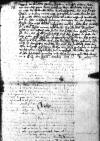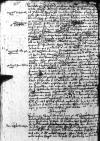Wir seindt unboswert E(wer) E(rbarkei)t zugefaltenn gewes[...] hidden by binding⌈[...][...] hidden by binding⌉, die mit unserem v written over f⌈fvv written over f⌉er mit den vorschriftenn an den hochwirdigenn hernn Samuel Maciejowski (*1499 – †1550), humanist and diplomat, one of the most trusted advisors to King Sigismund I and then to his son Sigismund II Augustus; from 1521 Canon of the Collegiate Chapter in Sandomierz, and from 1530 in Kielce; from 1531 Canon of Gniezno; from 1532 or 1533 to 1537 royal secretary (previously scribe at the royal chancellery); 1537-1539 Grand Secretary; 1539-1547 Crown Vice-Chancellor; 1539-1541 Bishop of Chełm; 1541-1545 Bishop of Płock; 1545-1550 Bishop of Cracow; 1547-1550 Crown Grand Chancellor; in 1532 royal envoy to Rome; in 1534 and 1538 royal envoy to the local diets (WYCZAŃSKI 1990, p. 257-258; Urzędnicy 10, p. 184; PSB 19 Machowski - Maria Kazimiera, p. 64-69)⌊SamuelemSamuel Maciejowski (*1499 – †1550), humanist and diplomat, one of the most trusted advisors to King Sigismund I and then to his son Sigismund II Augustus; from 1521 Canon of the Collegiate Chapter in Sandomierz, and from 1530 in Kielce; from 1531 Canon of Gniezno; from 1532 or 1533 to 1537 royal secretary (previously scribe at the royal chancellery); 1537-1539 Grand Secretary; 1539-1547 Crown Vice-Chancellor; 1539-1541 Bishop of Chełm; 1541-1545 Bishop of Płock; 1545-1550 Bishop of Cracow; 1547-1550 Crown Grand Chancellor; in 1532 royal envoy to Rome; in 1534 and 1538 royal envoy to the local diets (WYCZAŃSKI 1990, p. 257-258; Urzędnicy 10, p. 184; PSB 19 Machowski - Maria Kazimiera, p. 64-69)⌋, bischofen zu Cracow (Kraków, Cracovia), city in southern Poland, Małopolska, on the Vistula river, from 1038 capital of the Kingdom of Poland⌊CrakowCracow (Kraków, Cracovia), city in southern Poland, Małopolska, on the Vistula river, from 1038 capital of the Kingdom of Poland⌋, / des reichs Poland (Kingdom of Poland, Polonia)⌊PolenPoland (Kingdom of Poland, Polonia)⌋ cantz hidden by binding⌈[z]z hidden by binding⌉ler, und den achbarwirdigen in the other hand, on the margin in place of crossed-out den wird achtbarwirdigen hern Sta⌈den wird achtbarwirdigen hern Sta den achbarwirdigen den achbarwirdigen in the other hand, on the margin in place of crossed-out den wird achtbarwirdigen hern Sta⌉ hern doctorem Stanisław Hozjusz (Stanisław Hosz, Stanislaus Hosius) (*1504 – †1579), diplomat and theologian; 1534-1538 secretary to the Bishops of Cracow Piotr Tomicki and Jan Chojeński; 1538-1549 royal secretary; 1538-1549 Canon of Ermland (Warmia) and from 1539 Cantor; 1540-1550 Canon of Cracow; 1549-1551 Bishop of Kulm (Chełmno); 1551-1579 Bishop of Ermland; in 1560 elevated to Cardinal; 1561-1563 Papal Legate to the General Council of Trent; in 1573 appointed Grand Penitentiary to Pope Gregory XIII (SBKW, p. 95-96; KOPICZKO 2, p. 129-130)⌊Hos[...] hidden by binding⌈[...][...] hidden by binding⌉Stanisław Hozjusz (Stanisław Hosz, Stanislaus Hosius) (*1504 – †1579), diplomat and theologian; 1534-1538 secretary to the Bishops of Cracow Piotr Tomicki and Jan Chojeński; 1538-1549 royal secretary; 1538-1549 Canon of Ermland (Warmia) and from 1539 Cantor; 1540-1550 Canon of Cracow; 1549-1551 Bishop of Kulm (Chełmno); 1551-1579 Bishop of Ermland; in 1560 elevated to Cardinal; 1561-1563 Papal Legate to the General Council of Trent; in 1573 appointed Grand Penitentiary to Pope Gregory XIII (SBKW, p. 95-96; KOPICZKO 2, p. 129-130)⌋ in sachen Peter Schissenteuber (†1561), 1531 wójt of Elbing (TOEPPEN 1881, p. 173, footnote 1)⌊Peter SchissenteuberPeter Schissenteuber (†1561), 1531 wójt of Elbing (TOEPPEN 1881, p. 173, footnote 1)⌋ botreffende / zugefallen gewesenn, wie auch E(wer) E(rbarkei)t superinscribed, in the hand of other⌈E(wer) E(rbarkei)tE(wer) E(rbarkei)t superinscribed, in the hand of other⌉ hieneben gesigelt mit in the other hand, superinscribed in place of crossed-out und⌈und mit mit in the other hand, superinscribed in place of crossed-out und⌉ deren copeienn zuschickenn. Da hidden by binding⌈[a]a hidden by binding⌉ uns aber E(wer) E(rbarkei)t an uns bogeret / ihnen auch ein ofne urkunde hidden by binding⌈[unde]unde hidden by binding⌉ under unserm siegel, / wie die sache zu Graudenz (Grudziądz, Graudentium), city in Poland, Voivodeship of Pomerania, on the upper east bank of the Vistula, Graudenz (taking turns with Marienburg (Malbork)) was the venue for the Provincial Diet of Royal Prussia, which were chaired by the bishop of Ermland (Warmia)⌊GraudentzGraudenz (Grudziądz, Graudentium), city in Poland, Voivodeship of Pomerania, on the upper east bank of the Vistula, Graudenz (taking turns with Marienburg (Malbork)) was the venue for the Provincial Diet of Royal Prussia, which were chaired by the bishop of Ermland (Warmia)⌋ vor den hern Council of Royal Prussia the most important local authority in Royal Prussia. It consisted of two bishops (of Ermland (Warmia), who served as the Council’s president, and of Kulm (Chełmno)), three voivodes (of Kulm, Marienburg (Malbork), and Pomerania), three castellans (of Kulm, Elbing (Elbląg), and Gdańsk (Danzig)), three chamberlains (of Kulm, Marienburg, and Pomerania), and representatives of the three Great Prussian Cities – Gdańsk, Thorn (Toruń), and Elbing (ACHREMCZYK 2016, p. 17-18)⌊re hidden by binding⌈[re]re hidden by binding⌉ AAWO, AB, D. 70, f. 318rtennCouncil of Royal Prussia the most important local authority in Royal Prussia. It consisted of two bishops (of Ermland (Warmia), who served as the Council’s president, and of Kulm (Chełmno)), three voivodes (of Kulm, Marienburg (Malbork), and Pomerania), three castellans (of Kulm, Elbing (Elbląg), and Gdańsk (Danzig)), three chamberlains (of Kulm, Marienburg, and Pomerania), and representatives of the three Great Prussian Cities – Gdańsk, Thorn (Toruń), and Elbing (ACHREMCZYK 2016, p. 17-18)⌋ ist vorhandelt worden, / zugebenn / uns thun bittenn, / hetten wir uns auch gerne darin wilferig kegen diesulben erzeiget, / wo nicht dis bodencken davon uns abgehalten, / das uns solchs zuthun in unserm namen nicht wol geburen will, / dieweil die sache nicht allem vor uns, sunder vor allen rethen ist vorbracht, / und da ihr entschaft genomen, / derwegen den, wo sulche urkundt zur recht kondte ausgegeben werden, / solte das billich in aller hern superinscribed⌈hernhern superinscribed⌉ redte namen und under des Royal Prussia (Prussia Regalis), region, part of Prussia annexed to the Kingdom of Poland in 1466 under the provisions of the Second Peace of Thorn⌊landesRoyal Prussia (Prussia Regalis), region, part of Prussia annexed to the Kingdom of Poland in 1466 under the provisions of the Second Peace of Thorn⌋ ingesigel geschenn. / Wir achtens aber davor, das solchs dem rechte widdrig sei, / den, / wie E(wer) E(rbarkei)t wissentlich, / das kein richter in sachen da echr uber gesse gesessen / zeugen ader zeugnus von sich geben kan, / so superinscribed⌈soso superinscribed⌉ wil das widder uns noch den hern redten geburenn. Ist auch zu der sachen unnotig, / den was die urkundt solte dar thun und anze gezeugen, / haben wir sunst genugsam in unserm vorschriften ausgedrucket und angezeigt. Bovelen hiemit E(wer) E(rbarkei)t gotlichen genaden mit langweriger gesuntheit.
AAWO, AB, D. 70, f. 318rtennCouncil of Royal Prussia the most important local authority in Royal Prussia. It consisted of two bishops (of Ermland (Warmia), who served as the Council’s president, and of Kulm (Chełmno)), three voivodes (of Kulm, Marienburg (Malbork), and Pomerania), three castellans (of Kulm, Elbing (Elbląg), and Gdańsk (Danzig)), three chamberlains (of Kulm, Marienburg, and Pomerania), and representatives of the three Great Prussian Cities – Gdańsk, Thorn (Toruń), and Elbing (ACHREMCZYK 2016, p. 17-18)⌋ ist vorhandelt worden, / zugebenn / uns thun bittenn, / hetten wir uns auch gerne darin wilferig kegen diesulben erzeiget, / wo nicht dis bodencken davon uns abgehalten, / das uns solchs zuthun in unserm namen nicht wol geburen will, / dieweil die sache nicht allem vor uns, sunder vor allen rethen ist vorbracht, / und da ihr entschaft genomen, / derwegen den, wo sulche urkundt zur recht kondte ausgegeben werden, / solte das billich in aller hern superinscribed⌈hernhern superinscribed⌉ redte namen und under des Royal Prussia (Prussia Regalis), region, part of Prussia annexed to the Kingdom of Poland in 1466 under the provisions of the Second Peace of Thorn⌊landesRoyal Prussia (Prussia Regalis), region, part of Prussia annexed to the Kingdom of Poland in 1466 under the provisions of the Second Peace of Thorn⌋ ingesigel geschenn. / Wir achtens aber davor, das solchs dem rechte widdrig sei, / den, / wie E(wer) E(rbarkei)t wissentlich, / das kein richter in sachen da echr uber gesse gesessen / zeugen ader zeugnus von sich geben kan, / so superinscribed⌈soso superinscribed⌉ wil das widder uns noch den hern redten geburenn. Ist auch zu der sachen unnotig, / den was die urkundt solte dar thun und anze gezeugen, / haben wir sunst genugsam in unserm vorschriften ausgedrucket und angezeigt. Bovelen hiemit E(wer) E(rbarkei)t gotlichen genaden mit langweriger gesuntheit.
 AAWO, AB, D. 70, f. 318rtenn
AAWO, AB, D. 70, f. 318rtenn
